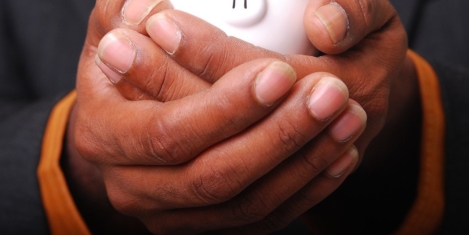To provide the best experiences, we use technologies like cookies to store and/or access device information. Consenting to these technologies will allow us to process data such as browsing behaviour or unique IDs on this site. Not consenting or withdrawing consent, may adversely affect certain features and functions.
The technical storage or access is strictly necessary for the legitimate purpose of enabling the use of a specific service explicitly requested by the subscriber or user, or for the sole purpose of carrying out the transmission of a communication over an electronic communications network.
The technical storage or access is necessary for the legitimate purpose of storing preferences that are not requested by the subscriber or user.
The technical storage or access that is used exclusively for statistical purposes.
The technical storage or access that is used exclusively for anonymous statistical purposes. Without a subpoena, voluntary compliance on the part of your Internet Service Provider, or additional records from a third party, information stored or retrieved for this purpose alone cannot usually be used to identify you.
The technical storage or access is required to create user profiles to send advertising, or to track the user on a website or across several websites for similar marketing purposes.
 ‘Stress by Sector’ data released by e-days claims concerning statistics that stress-related appointments are up generally in business by 64 percent over 2019. The data claims that the sectors struggling most with stress-related sickness are unsurprisingly healthcare (0.64 days of stress related absence on average per employee), followed by Government and International Affairs (0.57 days on average per employee) and Human Resources and staffing (0.39 days on average per employee). (more…)
‘Stress by Sector’ data released by e-days claims concerning statistics that stress-related appointments are up generally in business by 64 percent over 2019. The data claims that the sectors struggling most with stress-related sickness are unsurprisingly healthcare (0.64 days of stress related absence on average per employee), followed by Government and International Affairs (0.57 days on average per employee) and Human Resources and staffing (0.39 days on average per employee). (more…)





 Workers in Britain are facing inequality due to a stark difference in employers’ approaches to flexible working, with nearly half (46 percent) of employees saying they do not have flexible working arrangements – such as flexi-time, part-time working, compressed hours or job shares – in their current role. This is according to new research from the
Workers in Britain are facing inequality due to a stark difference in employers’ approaches to flexible working, with nearly half (46 percent) of employees saying they do not have flexible working arrangements – such as flexi-time, part-time working, compressed hours or job shares – in their current role. This is according to new research from the 
 A new survey from
A new survey from 
 The greater stress companies put on financial incentives and financial performance in bonus systems for CEOs, the more negative the impact is on the firm’s financial performance, claims new research from
The greater stress companies put on financial incentives and financial performance in bonus systems for CEOs, the more negative the impact is on the firm’s financial performance, claims new research from 
 BlackRock is one of the largest asset management companies on the planet. Each year, at the start of January, the CEO Larry Fink writes a letter addressed to the other CEOs of the world. In his New Year’s letter for 2020, Fink appealed in particular to his fellow CEOs’ sense of social responsibility. In particular, he focused in on the risks faced by the climate. “Climate risk is an investment risk,” and he called on all companies, both public and private, to create greater societal added value. “Society is looking increasingly to companies to solve social and economic problems,” he concludes, so asset managers should be encouraged to invest in companies with a ‘purpose’.
BlackRock is one of the largest asset management companies on the planet. Each year, at the start of January, the CEO Larry Fink writes a letter addressed to the other CEOs of the world. In his New Year’s letter for 2020, Fink appealed in particular to his fellow CEOs’ sense of social responsibility. In particular, he focused in on the risks faced by the climate. “Climate risk is an investment risk,” and he called on all companies, both public and private, to create greater societal added value. “Society is looking increasingly to companies to solve social and economic problems,” he concludes, so asset managers should be encouraged to invest in companies with a ‘purpose’. 
 Only 46 percent of employers plan to hire a young person between the age of 16 and 24 in the next year despite new Government incentives to do so, a report from the
Only 46 percent of employers plan to hire a young person between the age of 16 and 24 in the next year despite new Government incentives to do so, a report from the 
 As the world prepares to close the book on the unprecedented events of 2020 and looks ahead to 2021 with renewed hope and optimism, global research from
As the world prepares to close the book on the unprecedented events of 2020 and looks ahead to 2021 with renewed hope and optimism, global research from 
 Research published by
Research published by 
 The UK Green Building Council (UKGBC) has announced the start of a new project to plot a route to net zero carbon for the UK’s built environment sector, by developing a Net Zero Whole Life Carbon Roadmap. Hot on the heels of the Government’s new target to cut emissions by 68 percent by 2030, against 1990 levels, this project will identify how the built environment supports that objective and set a science-based trajectory to achieving net zero for the whole sector by 2050. The roadmap will cover all building types and infrastructure, all built environment stakeholders and sub-sectors and address carbon across the whole building lifecycle.
The UK Green Building Council (UKGBC) has announced the start of a new project to plot a route to net zero carbon for the UK’s built environment sector, by developing a Net Zero Whole Life Carbon Roadmap. Hot on the heels of the Government’s new target to cut emissions by 68 percent by 2030, against 1990 levels, this project will identify how the built environment supports that objective and set a science-based trajectory to achieving net zero for the whole sector by 2050. The roadmap will cover all building types and infrastructure, all built environment stakeholders and sub-sectors and address carbon across the whole building lifecycle. 
 When we think about inclusivity and diversity in the corporate world, we often think of racial and cultural diversity, gender, or LGBTQ+ inclusion—but one aspect that has been too long forgotten or ignored is the topic of disability inclusion. Caroline Casey, disability activist, CEO and founder of the
When we think about inclusivity and diversity in the corporate world, we often think of racial and cultural diversity, gender, or LGBTQ+ inclusion—but one aspect that has been too long forgotten or ignored is the topic of disability inclusion. Caroline Casey, disability activist, CEO and founder of the 
 The number of companies monitoring their employees is growing. According to a Gartner survey, more than 22 percent of employees use employee movement data, while 17 percent of them are monitoring computer usage. With companies choosing to monitor employees, privacy laws are also catching up, and thus there is a need for explaining employee monitoring to prospective hires. Employee monitoring is defined as the use of monitoring devices and methods by companies to learn about their employees’
The number of companies monitoring their employees is growing. According to a Gartner survey, more than 22 percent of employees use employee movement data, while 17 percent of them are monitoring computer usage. With companies choosing to monitor employees, privacy laws are also catching up, and thus there is a need for explaining employee monitoring to prospective hires. Employee monitoring is defined as the use of monitoring devices and methods by companies to learn about their employees’ 







January 7, 2021
You will hear a lot more about purpose, communication and rituals at work this year
by Imke Schuller • Comment, Working culture